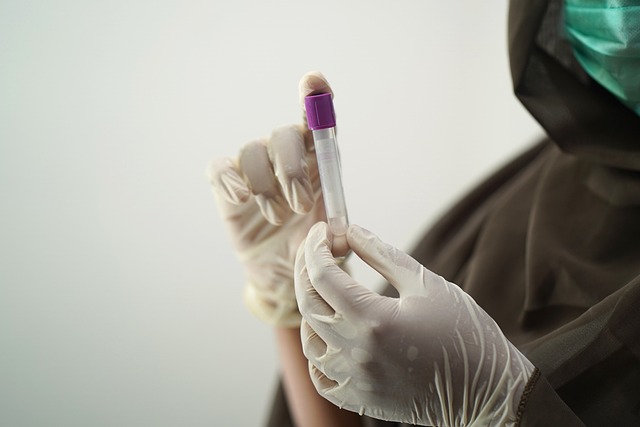The UK's introduction of the Blood Test at Home service has revolutionized liver health monitoring through telemedicine, offering patients a non-invasive and convenient way to self-administer blood tests for liver function markers such as ALT, AST, GGT, ALP, and total bilirubin from home. This innovative approach enables accurate diagnosis and management of conditions like hepatitis and cirrhosis by providing medical professionals with critical data. The success of this service depends on the rigorous training of healthcare providers to ensure sample collection, handling, and analysis are performed consistently and accurately across various testing environments. These at-home tests are regulated under strict standards in the UK to ensure their reliability and safety, making them a viable alternative to traditional clinic-based assessments. The program empowers individuals to proactively manage their liver health, supports timely medical intervention, and aligns with the broader shift towards personalized medicine, enhancing patient autonomy while delivering essential data for healthcare providers to make informed treatment decisions.
The advent of telemedicine and remote healthcare monitoring has revolutionized patient care, with the UK Blood Test at Home emerging as a pivotal tool in liver function assessment. This article delves into the intricacies of this innovative approach, guiding medical professionals through understanding, interpreting, and applying liver function test results obtained from home-based blood tests within the UK. It explores the mechanisms behind key markers, the clinical applications of such tests, and the diagnostic considerations they entail in the evolving UK healthcare landscape. Understanding these aspects is crucial for healthcare providers to leverage this technology effectively, ensuring comprehensive patient care and early intervention for liver-related conditions.
Understanding the UK Blood Test at Home: A Comprehensive Guide for Medical Professionals on Liver Function Assessment

The advent of telemedicine and home testing has revolutionised healthcare, particularly in the realm of liver function assessment. The UK Blood Test at Home service is a testament to this evolution, providing medical professionals with an invaluable tool for monitoring patients’ hepatic health remotely. This service enables individuals to collect their own blood samples at home, using kit-based methods that are simple and minimally invasive. For medical professionals, understanding the protocols and interpretation of these home-administered tests is crucial for accurate diagnosis and effective patient management. The liver function test (LFT) at home in the UK is designed to measure enzymes such as alanine aminotransferase (ALT), aspartate aminotransferase (AST), gamma-glutamyl transferase (GGT), alkaline phosphatase (ALP), and total bilirubin, which are indicators of liver function and health. These tests can detect a range of conditions, from hepatitis to cirrhosis, by providing insights into the liver’s ability to process substances and produce bile. Medical professionals must be adept at interpreting these results within the clinical context, considering factors like patient history, symptomatology, and other diagnostic data to ascertain the underlying cause of abnormal test outcomes. The reliability and validity of home blood tests are paramount, and thus, training in the collection, handling, and interpretation of such samples is essential for healthcare providers. This ensures that patients receive consistent and reliable care, regardless of whether testing takes place in a clinical setting or at home.
The Mechanisms and Interpretation of Liver Function Markers in Home-Based Blood Tests within the UK Context

In the UK, home-based blood tests have become a pivotal tool for monitoring liver health, offering patients and healthcare providers a convenient means to assess liver function markers. These tests measure substances indicative of liver function, such as alanine aminotransferase (ALT) and aspartate aminotransferase (AST), which are enzymes released into the bloodstream when liver cells are damaged. Additionally, the tests evaluate bilirubin levels, a byproduct of red blood cell breakdown that, when elevated, can signal liver dysfunction or bile duct obstruction. Gamma-glutamyl transferase (GGT) and alkaline phosphatase (ALP) are also key markers; they reflect the condition of liver cells and bile ducts, respectively. The interpretation of these markers is crucial for diagnosing hepatic conditions such as hepatitis, cirrhosis, or gallstones. Healthcare professionals can utilise UK Blood test at home services to track disease progression, monitor treatment effectiveness, and guide clinical decision-making. This non-invasive approach empowers individuals to proactively manage their liver health from the comfort of their own home, ensuring timely medical intervention if necessary. The reliability of home-based blood tests hinges on strict regulatory standards in the UK, which guarantee the accuracy and safety of the test kits and results, providing a trustworthy alternative to traditional in-clinic liver function assessments.
Clinical Applications and Diagnostic Considerations of At-Home Liver Function Tests in the UK Healthcare System

In the UK healthcare system, the clinical applications and diagnostic considerations of at-home liver function tests have gained significant attention, particularly with the integration of telemedicine and home health services. The advent of UK Blood Test At Home services has made it feasible for individuals to monitor their liver health remotely, providing a non-invasive method for early detection and management of liver conditions. These at-home tests offer convenience and accessibility, allowing patients to collect samples under medical supervision or through self-collection kits. This approach can be particularly beneficial for high-risk populations, such as those with chronic liver diseases like hepatitis or cirrhosis, enabling them to track their condition’s progression without the need for frequent hospital visits. The diagnostic accuracy of these tests is paramount; they must be comparable to traditional in-clinic liver function assessments. Healthcare professionals must consider the standardization of test protocols and the quality control measures necessary to ensure results are reliable and actionable. Additionally, the secure transmission and handling of test samples and results are critical to maintain patient confidentiality and privacy, as well as to facilitate timely medical interventions when warranted. The integration of at-home liver function tests within the UK’s healthcare infrastructure represents a significant step towards personalized medicine, offering patients more autonomy over their health while still providing physicians with valuable diagnostic data for effective treatment planning.
UK blood tests administered at home have become a pivotal tool for medical professionals, enabling the efficient assessment of liver function. This article has delved into the intricacies of these tests, elucidating the mechanisms and interpretation of relevant markers. It has also explored the clinical applications, highlighting the significance of at-home liver function tests within the UK’s healthcare framework. As accessibility and convenience continue to shape medical diagnostics, understanding and utilising home-based liver function tests are imperative for professionals to provide optimal patient care. This comprehensive guide underscores the importance of this advancement, ensuring that healthcare providers can effectively monitor and diagnose hepatic health from the comfort of patients’ homes, thereby enhancing disease management and early intervention strategies.
